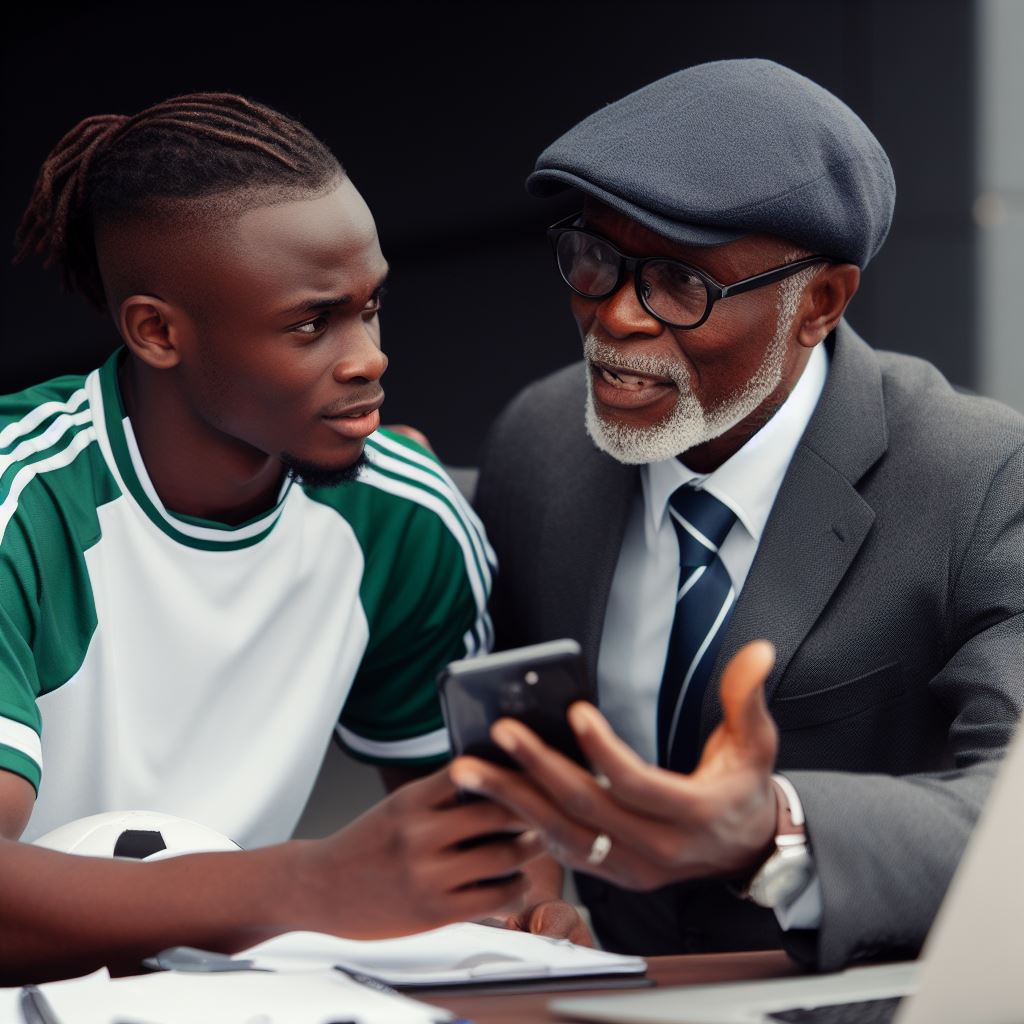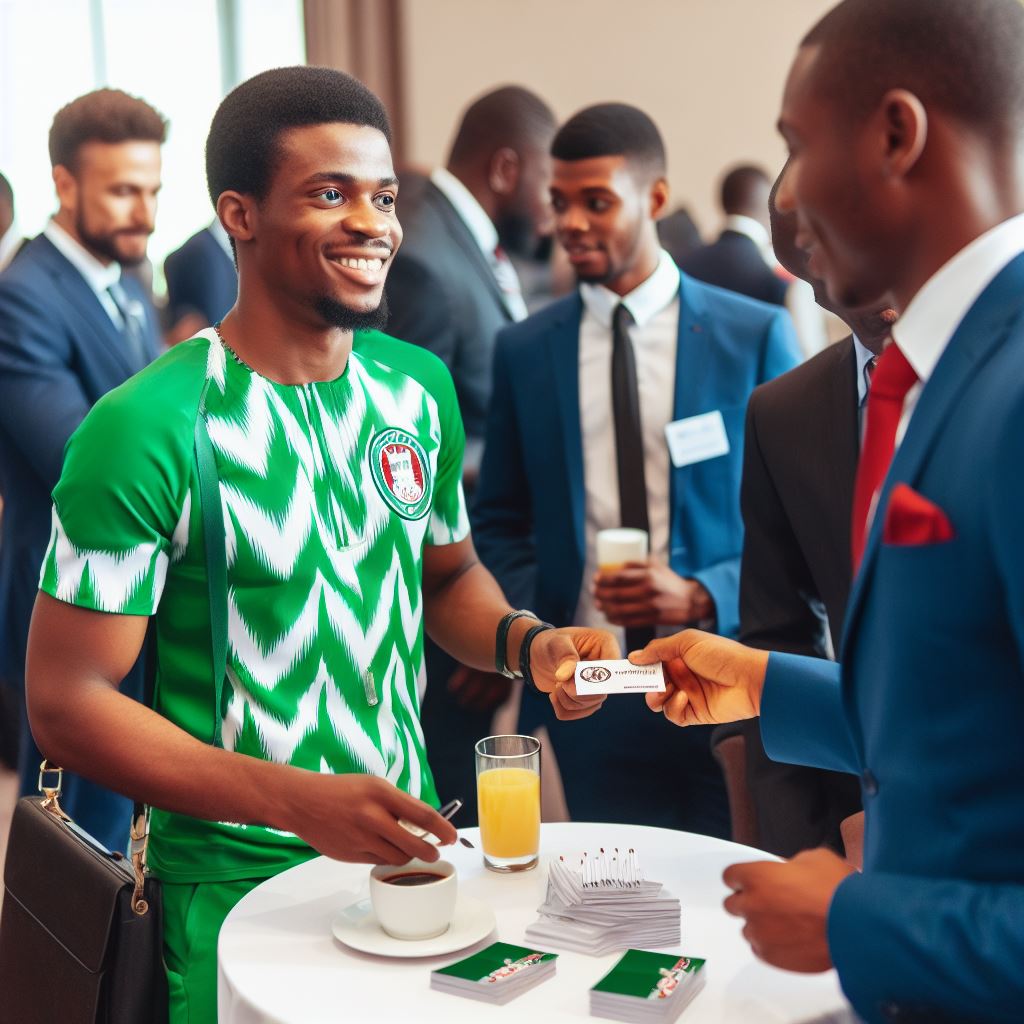Introduction
Let’s explore essential skills for a successful sports agent in Nigeria.
Sports agency is a growing industry in Nigeria, representing athletes across various sports.
The role of a sports agent is to represent and negotiate on behalf of their clients, ensuring their best interests are protected.
In order to be successful in this field, sports agents need to possess certain essential skills.
One of the most important skills for a sports agent is communication.
Effective communication is necessary for building relationships with clients, understanding their needs, and negotiating contracts on their behalf.
Agents must be able to effectively communicate with athletes, teams, and other stakeholders in the industry.
Another essential skill is negotiation. Sports agents are responsible for negotiating contracts, endorsement deals, and other opportunities for their clients.
They must be skilled in bargaining and securing favorable terms for their clients while balancing the needs of the teams or sponsors.
In addition, sports agents need to have a strong knowledge of the sports industry, including the rules, regulations, and trends.
This knowledge helps agents guide their clients in making informed decisions and navigating the complex world of professional sports.
Furthermore, a sports agent must possess excellent organizational skills.
They need to manage multiple clients, schedules, and contracts simultaneously.
Being organized allows agents to efficiently handle their clients’ affairs and ensure that their professional obligations are met.
Essentially, having essential skills is crucial for a successful sports agent in Nigeria.
Effective communication, negotiation, sports industry knowledge, and organizational skills are all vital for agents to effectively represent their clients and thrive in this competitive industry.
Knowledge of Sports Industry
A successful sports agent in Nigeria should possess a strong knowledge of the sports industry.
This includes:
A. Understanding of different sports and their marketability in Nigeria
- Knowing which sports are popular and have a large fan base in Nigeria is crucial.
- An agent should identify the market potential and commercial opportunities for each sport.
- Being able to assess the marketability of athletes in specific sports is essential.
B. Familiarity with sports rules and regulations
- An agent must have a comprehensive understanding of the rules and regulations governing each sport.
- This knowledge helps in negotiating contracts, ensuring compliance, and protecting the best interests of athletes.
- Staying updated with any rule changes or developments is essential for success in the industry.
C. Awareness of industry trends and developments
- Keeping up with the latest industry trends and developments is crucial for a sports agent.
- Knowledge of emerging sports, new marketing strategies, and technological advancements is valuable.
- Being aware of industry dynamics helps in adapting strategies and staying competitive.
A successful sports agent combines these elements of knowledge to excel in the industry.
They understand the market potential of different sports, utilize their familiarity with rules and regulations to negotiate contracts effectively, and stay ahead of industry trends to capitalize on new opportunities.
Read: Networking Tips for Aspiring Sports Agents in Nigeria
Negotiation Skills
A. Ability to negotiate contracts, endorsements, and sponsorship deals on behalf of athletes
Negotiation skills are a crucial aspect of being a successful sports agent in Nigeria.
As an agent, your main responsibility is to secure the best possible contracts, endorsements, and sponsorship deals for your athletes.
This requires the ability to negotiate effectively on their behalf.
B. Understanding of legal and financial aspects of negotiations
To be a successful sports agent, it is essential to have a deep understanding of the legal and financial aspects related to negotiations.
This includes knowledge of contract laws, financial regulations, and the overall business of sports.
C. Communication skills to effectively discuss terms with athletes, teams, and sponsors
Clear and effective communication is key in any negotiation process.
As a sports agent, you must be able to articulate your athletes’ needs and goals to teams and sponsors.
Additionally, you need to listen carefully to the counteroffers and concerns raised by the other party.
Good negotiation skills involve being able to find a middle ground where both parties feel satisfied with the final deal.
This may require compromise and creative problem-solving.
In addition to negotiation skills, a successful sports agent should possess other essential qualities.
These include strong relationship-building abilities, a keen eye for talent, and a solid understanding of the sports industry in Nigeria.
Building positive relationships with athletes, teams, and sponsors is vital for long-term success.
Maintaining open lines of communication and trust will help you secure better deals and opportunities for your clients.
Furthermore, having an eye for talent allows you to identify promising athletes and nurture their careers.
This involves scouting for potential clients, attending sports events, and keeping up-to-date with the latest trends in the sports industry.
Additionally, a sound knowledge of the Nigerian sports industry is crucial.
Understanding the local sports culture, regulations, and market trends will give you an edge when negotiating deals on behalf of your athletes.
In short, negotiation skills are essential for a successful sports agent in Nigeria.
The ability to negotiate contracts, endorsements, and sponsorship deals is vital, along with a deep understanding of the legal and financial aspects of negotiations.
Effective communication skills are also necessary for fruitful discussions with athletes, teams, and sponsors.
Combined with other qualities such as relationship-building abilities, talent spotting, and industry knowledge, these skills will pave the way for a prosperous career as a sports agent in Nigeria.
Read: Challenges Faced by Sports Agents in Nigeria: An Overview
Networking and Relationship Building
A successful sports agent in Nigeria understands the importance of networking and building strong relationships within the sports industry.
These connections are crucial for their career and the success of their clients.
A. Development of a strong professional network within the sports industry
- Attending industry events and conferences to meet other professionals and expand their network.
- Joining sports organizations, associations, and clubs to connect with like-minded individuals.
- Utilizing social media platforms to engage with professionals and potential clients.
- Regularly reaching out to colleagues and mentors for advice and guidance.
- Building relationships with sports journalists and media personnel to increase visibility and opportunities.
B. Building relationships with athletes, coaches, and team owners
- Establishing trust and credibility by delivering excellent results and consistently advocating for their clients.
- Regularly communicating and maintaining open lines of dialogue with athletes to understand their goals and aspirations.
- Developing strong relationships with coaches to ensure a solid understanding of their coaching philosophies and player development strategies.
- Cultivating relationships with team owners and executives to negotiate contracts and secure beneficial deals for clients.
- Showcasing personal integrity and professionalism when interacting with athletes, coaches, and team owners.
C. Collaboration with other sports agencies for mutual benefits
- Seeking opportunities to collaborate with other sports agencies to share resources and expand client opportunities.
- Participating in joint ventures and partnerships to leverage each other’s expertise and networks.
- Engaging in professional associations or groups to foster collaboration and build a strong support system within the industry.
- Sharing industry insights and best practices with peers to collectively elevate the profession.
- Utilizing networking events to meet and connect with other sports agents for potential collaborations and referrals.
In fact, networking and relationship building are essential skills for a successful sports agent in Nigeria.
The development of a strong professional network, building relationships with athletes, coaches, and team owners, and collaboration with other sports agencies are key factors that contribute to their success.
Read: Legal Requirements for Sports Agents in Nigeria: Know More
Marketing and Branding
A successful sports agent in Nigeria must possess essential skills in marketing and branding to effectively promote athletes’ image and marketability.
This section will explore the necessary knowledge and understanding required in this field.
A. Knowledge of marketing strategies to promote athletes’ image and marketability
- Understanding various marketing techniques is crucial for a sports agent to enhance athletes’ recognition and market value.
- By studying target audiences and analyzing trends, agents can devise effective strategies to reach the right audience and promote athletes successfully.
- Utilizing traditional marketing tools, such as print media, radio, and television, can still be invaluable in increasing athletes’ visibility and reach.
- Collaborating with marketing experts and professionals allows sports agents to gather insights and maximize their promotional efforts.
- Continuous learning and staying updated with the latest marketing trends are vital to adapt to the ever-evolving industry and make informed decisions.
B. Ability to create impactful branding campaigns
- Developing a strong personal brand for athletes is essential to stand out in a highly competitive sports industry.
- Sports agents need to create comprehensive branding campaigns that align with athletes’ values, personality, and goals.
- These campaigns must effectively communicate athletes’ unique attributes and differentiate them from their competitors.
- Identifying and leveraging athletes’ strengths can contribute to creating a brand that resonates with fans, sponsors, and the public.
- Collaborating with graphic designers, content creators, and public relations professionals helps agents create visually appealing and engaging branding materials.
C. Understanding of social media and digital marketing for expanding athletes’ reach
- Social media platforms have revolutionized the way athletes can connect with their fans, and agents must understand how to leverage these platforms.
- A deep understanding of social media algorithms, trends, and best practices enables agents to optimize athletes’ visibility and engagement.
- Developing compelling content tailored to each platform and audience enhances athletes’ online presence and extends their reach.
- Engaging with fans, building communities, and promoting athletes’ achievements through social media helps cultivate a strong fan base.
- Utilizing digital marketing techniques, such as email marketing, influencer collaborations, and targeted online advertisements, can further expand athletes’ reach and attract potential sponsors.
In essence, a successful sports agent in Nigeria must possess a strong foundation in marketing and branding.
The ability to develop effective marketing strategies, create impactful branding campaigns, and harness the power of social media and digital marketing are crucial for promoting athletes’ image and marketability in today’s competitive sports industry.
Read: Nigeria’s Top Sports Agents: Success Stories to Inspire

Legal and Contractual Understanding
A successful sports agent in Nigeria must possess a strong understanding of the legal and contractual aspects of the sports industry.
This includes familiarity with the legal frameworks and regulations governing sports contracts in Nigeria.
1. Familiarity with legal frameworks and regulations
To effectively represent athletes, a sports agent needs to be well-versed in the legal frameworks and regulations that govern sports contracts in Nigeria.
This includes knowledge of relevant legislations, such as the Nigerian Sports Law and regulations set by sports governing bodies.
2. Ability to draft and review contracts
A crucial skill for a sports agent is the ability to draft and review contracts.
This is essential to ensure that athletes’ interests are protected and that contracts are fair and legally binding.
Agents must possess excellent attention to detail and a thorough understanding of contract principles.
3. Knowledge of dispute resolution mechanisms
Contractual disputes can arise in the sports industry, and a successful sports agent needs to be prepared to handle them effectively.
Having knowledge of dispute resolution mechanisms such as negotiation, mediation, and arbitration is crucial in order to protect the athlete’s rights and interests.
4. Understanding of athlete representation
Sports agents must understand the unique dynamics of athlete representation.
They need to be aware of the legal obligations and responsibilities involved in representing athletes, including fiduciary duties and the duty of loyalty towards their clients.
5. Awareness of regulatory bodies
The sports industry in Nigeria is regulated by various governing bodies, such as the Nigeria Football Federation (NFF) and the Athletics Federation of Nigeria (AFN).
A successful sports agent should be familiar with these bodies and their respective regulations.
6. Negotiation skills
Negotiation is a key aspect of representing athletes in contract discussions.
A skilled sports agent should have strong negotiation skills to secure favorable terms for their clients while maintaining a professional and cooperative relationship with clubs and sponsors.
7. Contract management
In addition to drafting and reviewing contracts, sports agents must also be proficient in contract management.
This involves tracking contract expiration dates, renegotiating terms, and ensuring compliance with contractual obligations.
8. Continual learning and staying updated
The sports industry is ever-evolving, and legal frameworks and regulations can change over time.
A successful sports agent should be committed to continuous learning and staying updated on the latest developments in sports law to best serve their clients.
In general, a successful sports agent in Nigeria must possess a strong understanding of legal and contractual matters in the sports industry.
This includes being familiar with the legal frameworks and regulations governing sports contracts, having the ability to draft and review contracts, and knowledge of dispute resolution mechanisms.
By acquiring and honing these essential skills, a sports agent can effectively protect the interests of athletes and navigate the complex legal landscape of the Nigerian sports industry.
Financial Management
By effectively managing the finances of athletes, a sports agent can greatly contribute to their success and overall well-being.
It is not only about negotiating the best contracts and endorsement deals, but also about ensuring that the athletes’ finances are secure and sustainable in the long run.
A. Handling athletes’ finances, including contract negotiations and endorsement deals
When it comes to handling athletes’ finances, contract negotiations play a crucial role.
A skilled sports agent should be able to negotiate favorable terms and conditions for their clients, ensuring that they receive fair compensation for their skills and performances.
They should also understand the legal aspects of contracts to protect the athletes’ interests.
In addition to contracts, endorsement deals are another important aspect of an athlete’s financial management.
A sports agent should have the ability to secure endorsement deals with reputable brands that align with the athletes’ image and values.
These deals can provide significant additional income for the athletes, but it is crucial for the agent to ensure that the terms of the deals are favorable and do not compromise the athletes’ reputation or integrity.
B. Understanding of financial planning, budgeting, and investment options
Financial planning and budgeting are fundamental skills for a sports agent.
They should be able to create realistic financial plans that consider the athletes’ income and expenses.
This involves forecasting future earnings, tracking expenses, and setting specific financial goals.
Publish Your Professional Profile, Business or Brand
Showcase your expertise, gain trust, and boost visibility instantly on Professions.ng.
Publish NowBy helping their clients manage their money effectively, sports agents can provide stability and security in their financial lives.
Investment options also play a crucial role in athletes’ financial management.
A sports agent should have a good understanding of different investment opportunities, such as stocks, real estate, and businesses.
They should be able to guide their clients in making informed investment decisions that can grow their wealth over time.
C. Ability to ensure athletes’ financial security and long-term sustainability
Ultimately, a successful sports agent in Nigeria must prioritize the financial security and long-term sustainability of their clients.
This involves not only handling their current finances but also planning for their future.
By providing expert financial advice and guidance, a sports agent can help athletes achieve financial freedom and peace of mind throughout their career and beyond.
Communication and Interpersonal Skills
A. Effective communication with athletes, teams, sponsors, and other stakeholders
An essential skill for a successful sports agent in Nigeria is the ability to communicate effectively with different individuals and groups involved in the sports industry.
This includes athletes, teams, sponsors, and other stakeholders.
Communication is a vital aspect of being a sports agent, as it is through effective communication that agents can convey important information, negotiate contracts, and build strong relationships with their clients and other parties.
Agents must be able to use clear and concise language to articulate their thoughts, ideas, and plans to athletes, teams, sponsors, and other stakeholders.
They should be able to adapt their communication style and tone depending on the audience and context.
Additionally, sports agents must be excellent written communicators, as they often need to draft contracts, proposals, and other legal documents.
They must pay attention to detail and ensure that their written communication is professional and error-free.
B. Active listening skills to understand athletes’ needs and concerns
In addition to effective communication, sports agents must possess active listening skills to understand their athletes’ needs, concerns, and aspirations.
Active listening involves paying full attention to the speaker, clarifying information, and responding appropriately.
By actively listening, sports agents can develop a deep understanding of their athletes’ goals, desires, and challenges.
This skill is crucial for building trust and rapport with athletes, as it shows that the agent genuinely cares about their client’s well-being and success.
Active listening also helps agents tailor their strategies and decisions to better align with their athletes’ individual needs.
C. Negotiation, persuasion, and conflict resolution abilities
Another essential skill for a successful sports agent is the ability to negotiate effectively.
Negotiation skills are crucial in securing favorable contracts, endorsements, and sponsorship deals for athletes.
Sports agents must be persuasive and able to present compelling arguments to convince potential sponsors, teams, or other stakeholders to invest in their clients.
They should be able to highlight their athletes’ unique qualities and value, showcasing why they are worthy of support and investment.
Conflict resolution is also an important skill for sports agents.
There will inevitably be disagreements or conflicts that arise during contract negotiations or other aspects of their work.
Agents must be skilled in finding compromises and resolving conflicts in a fair and satisfactory manner for all parties involved.
Effective negotiation, persuasion, and conflict resolution abilities can greatly enhance a sports agent’s reputation and success, as they contribute to securing favorable deals for their clients and maintaining positive relationships with stakeholders.
In review, communication and interpersonal skills are vital for a successful sports agent in Nigeria.
Effective communication with athletes, teams, sponsors, and other stakeholders, active listening to understand athletes’ needs, and negotiation, persuasion, and conflict resolution abilities are all crucial abilities that contribute to an agent’s success in the sports industry.
Adaptability and Resilience
A successful sports agent in Nigeria must possess certain essential skills that enable them to navigate the dynamic nature of the sports industry.
Adaptability and resilience are crucial attributes that can set apart a sports agent from their competitors.
A. Ability to cope with the dynamic nature of the sports industry
The sports industry is constantly evolving, with new trends, technologies, and strategies emerging regularly.
A sports agent must be adaptable and open to change in order to stay relevant and succeed in this fast-paced environment.
They should be proactive in keeping up with industry developments, attending conferences, workshops, and networking events to gain insights and expand their knowledge base.
B. Resilience to handle setbacks, rejections, and challenges
The life of a sports agent is not without its fair share of setbacks, rejections, and challenges.
Dealing with contract negotiations, managing athletes’ expectations, and facing tough competition from other agents can be mentally and emotionally draining.
A resilient sports agent knows how to bounce back from setbacks and view them as learning opportunities.
They remain focused on their goals, maintain a positive attitude, and persist in their efforts even when faced with adversity.
C. Willingness to learn and adapt to changes within the industry
The sports industry is constantly evolving, and successful sports agents understand the importance of continuous learning and adaptation.
They stay updated on industry trends, rule changes, and new technologies that can impact the sports landscape.
They are proactive in seeking new knowledge, attending seminars, and participating in professional development programs to enhance their skills and stay ahead of the curve.
By staying adaptable and willing to learn, they can better serve the needs of their clients.
In brief, adaptability and resilience are essential skills for a successful sports agent in Nigeria.
The ability to cope with the dynamic nature of the sports industry, handle setbacks, and embrace change is critical for long-term success.
By constantly learning, staying adaptable, and demonstrating resilience, sports agents can position themselves as trusted advisors to their clients and navigate the challenges of the industry with confidence.
These qualities will separate them from the competition and contribute to their overall success.
Conclusion
Being a successful sports agent in Nigeria requires a set of essential skills.
These skills include strong negotiation abilities, excellent communication skills, a deep understanding of the sports industry, business acumen, and networking skills.
By developing these skills, aspiring sports agents can increase their chances of success in this competitive field.
For aspiring sports agents in Nigeria, it is crucial to recognize the importance of developing these essential skills.
By honing their negotiation, communication, industry knowledge, business acumen, and networking abilities, they can position themselves for success in this industry.
Hard work and dedication to skill development will pay off in the long run.
Becoming a sports agent in Nigeria is a challenging endeavor, but it is not impossible.
By acquiring and strengthening the essential skills mentioned, aspiring sports agents can overcome obstacles and achieve their goals.
With determination, passion, and a commitment to continuous learning, they can make a significant impact in the Nigerian sports industry.




